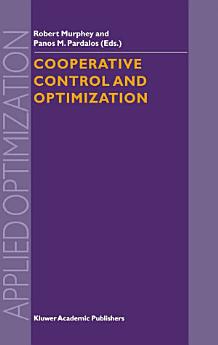Cooperative Control and Optimization
Robert Murphey · Panos M. Pardalos
kwi 2006 · Applied Optimization Część 66 · Springer Science & Business Media
E-book
308
Strony
reportOceny i opinie nie są weryfikowane. Więcej informacji
Informacje o e-booku
A cooperative system is defined to be multiple dynamic entities that share information or tasks to accomplish a common, though perhaps not singular, objective. Examples of cooperative control systems might include: robots operating within a manufacturing cell, unmanned aircraft in search and rescue operations or military surveillance and attack missions, arrays of micro satellites that form a distributed large aperture radar, employees operating within an organization, and software agents. The term entity is most often associated with vehicles capable of physical motion such as robots, automobiles, ships, and aircraft, but the definition extends to any entity concept that exhibits a time dependent behavior. Critical to cooperation is communication, which may be accomplished through active message passing or by passive observation. It is assumed that cooperation is being used to accomplish some common purpose that is greater than the purpose of each individual, but we recognize that the individual may have other objectives as well, perhaps due to being a member of other caucuses. This implies that cooperation may assume hierarchical forms as well. The decision-making processes (control) are typically thought to be distributed or decentralized to some degree. For if not, a cooperative system could always be modeled as a single entity. The level of cooperation may be indicated by the amount of information exchanged between entities. Cooperative systems may involve task sharing and can consist of heterogeneous entities. Mixed initiative systems are particularly interesting heterogeneous systems since they are composed of humans and machines. Finally, one is often interested in how cooperative systems perform under noisy or adversary conditions.
In December 2000, the Air Force Research Laboratory and the University of Florida successfully hosted the first Workshop on Cooperative Control and Optimization in Gainesville, Florida. This book contains selected refereed papers summarizing the participants' research in control and optimization of cooperative systems.
Audience: Faculty, graduate students, and researchers in optimization and control, computer sciences and engineering.
In December 2000, the Air Force Research Laboratory and the University of Florida successfully hosted the first Workshop on Cooperative Control and Optimization in Gainesville, Florida. This book contains selected refereed papers summarizing the participants' research in control and optimization of cooperative systems.
Audience: Faculty, graduate students, and researchers in optimization and control, computer sciences and engineering.
Oceń tego e-booka
Podziel się z nami swoją opinią.
Informacje o czytaniu
Smartfony i tablety
Zainstaluj aplikację Książki Google Play na Androida i iPada/iPhone'a. Synchronizuje się ona automatycznie z kontem i pozwala na czytanie w dowolnym miejscu, w trybie online i offline.
Laptopy i komputery
Audiobooków kupionych w Google Play możesz słuchać w przeglądarce internetowej na komputerze.
Czytniki e-booków i inne urządzenia
Aby czytać na e-papierze, na czytnikach takich jak Kobo, musisz pobrać plik i przesłać go na swoje urządzenie. Aby przesłać pliki na obsługiwany czytnik, postępuj zgodnie ze szczegółowymi instrukcjami z Centrum pomocy.










